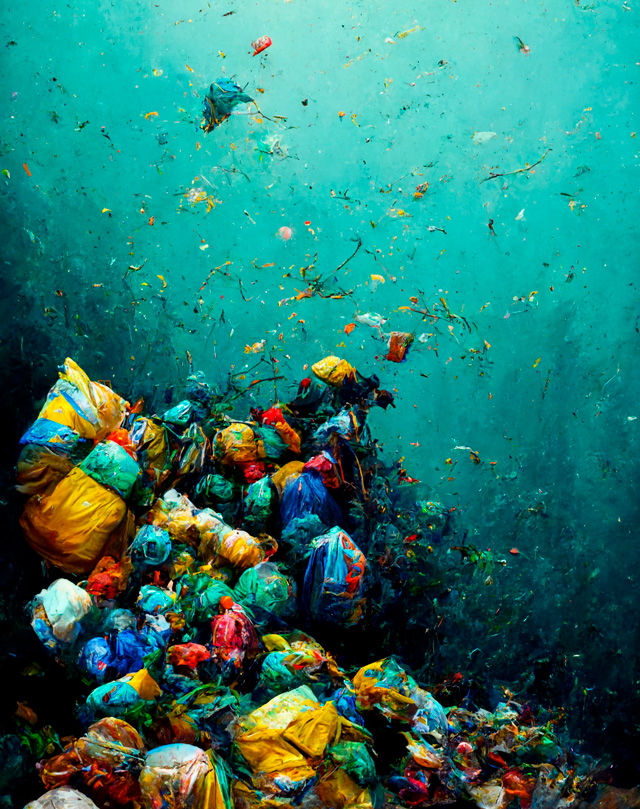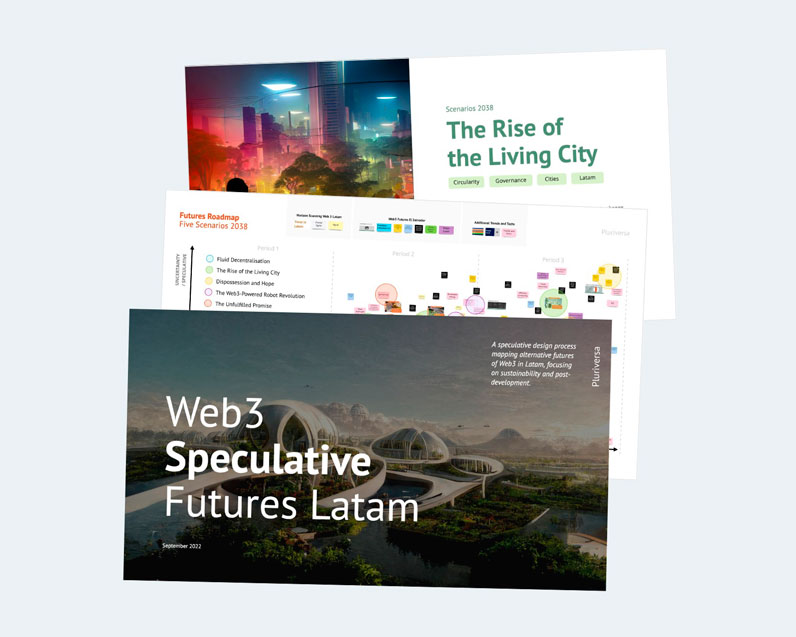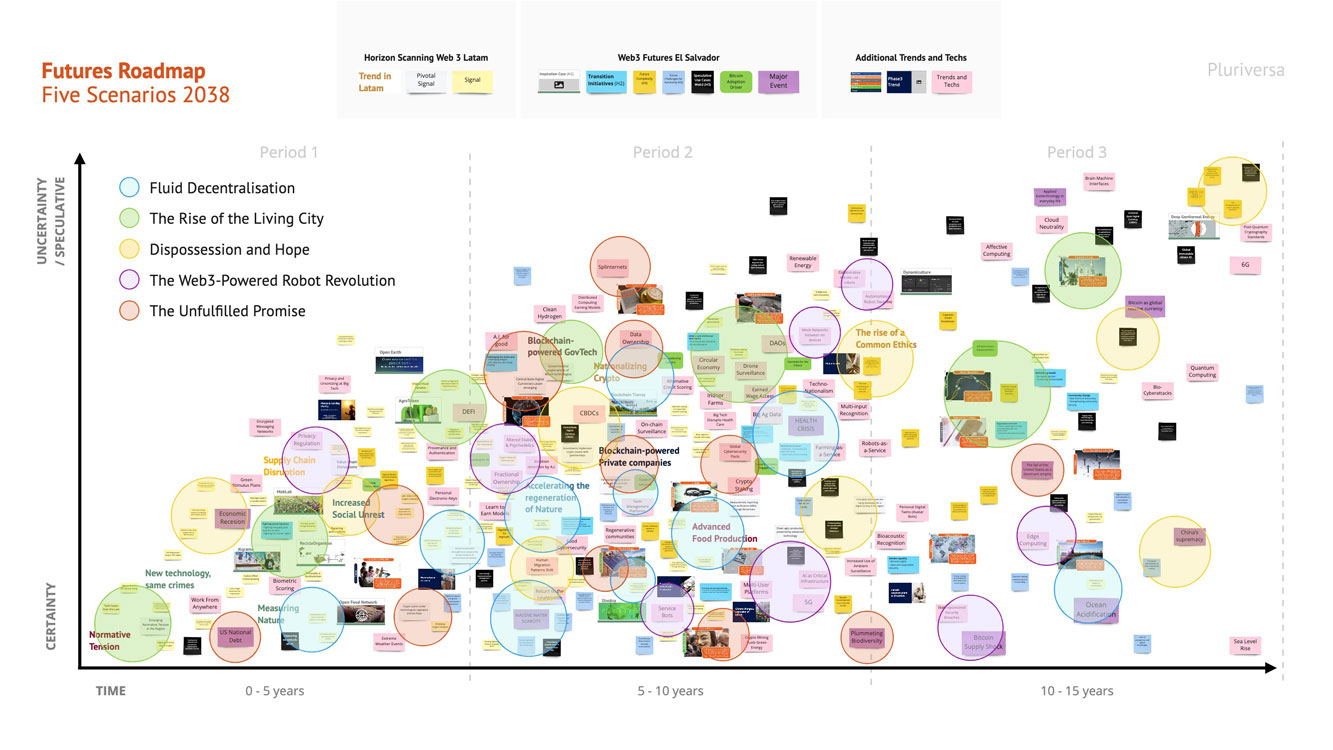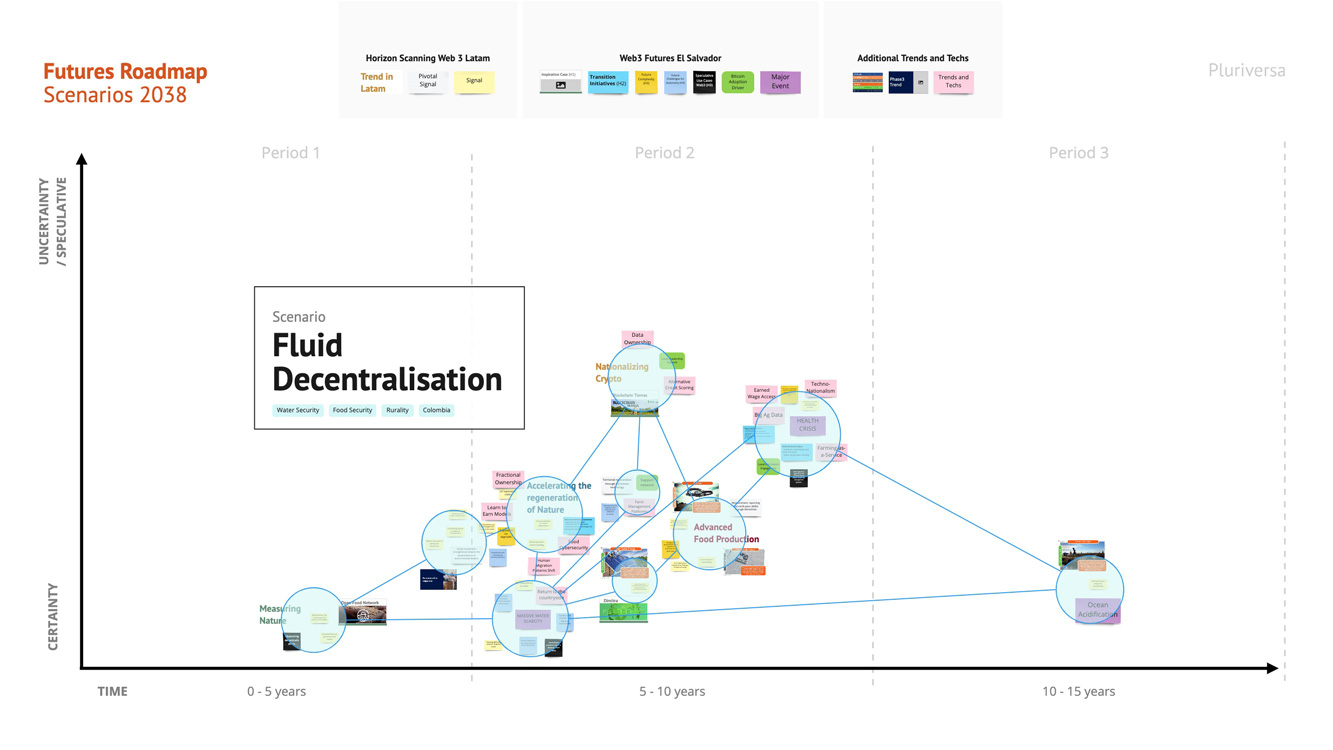Our scenarios
Fluid Decentralization - 2038
Scenario overview
Colombia confronted massive droughts thanks to international cooperation and Web3 technologies. This last was crucial to help coordinate the population and solve the issue through decentralized cooperatives. The result was new forms of governance recognized by the government as key agents to fight climate change and protect the territory. New forms of decentralized science and protecting nature emerged, as well as essential changes in how rural communities organized themselves. Now, thanks to this new model, international cooperation revolves transparently around the causes being supported. However, other challenges exist, like new forms of territorial violence.
*This scenario was created originally in British English.
-
Web3 Speculative Futures Latam
Sector:
Web3, Bitcoin, Blockchain
Key topics:
Water security, Food security, Rurality, Colombia
Time horizon:
2038

Stronger than the drought
There were thirsty years for Colombia, but after great local efforts and thanks to international cooperation, the country managed to protect its water resource and, thus, maintain its position as one of the countries with the highest freshwater resources per capita.
The country is now not only a vital source of food for the planet but also a source of humanitarian assistance in drinking water for those partner countries that lack the resource.
The days when a third of the country’s population lacked sustained access to safe drinking water are gone, and the degradation of natural resources nearly led to the collapse of the nation’s most important water systems has stopped.
After significant barriers and a major health crisis caused by water shortages, the region has a glimmer of hope again, with laws for regeneration and precise regulation to encourage degrowth.
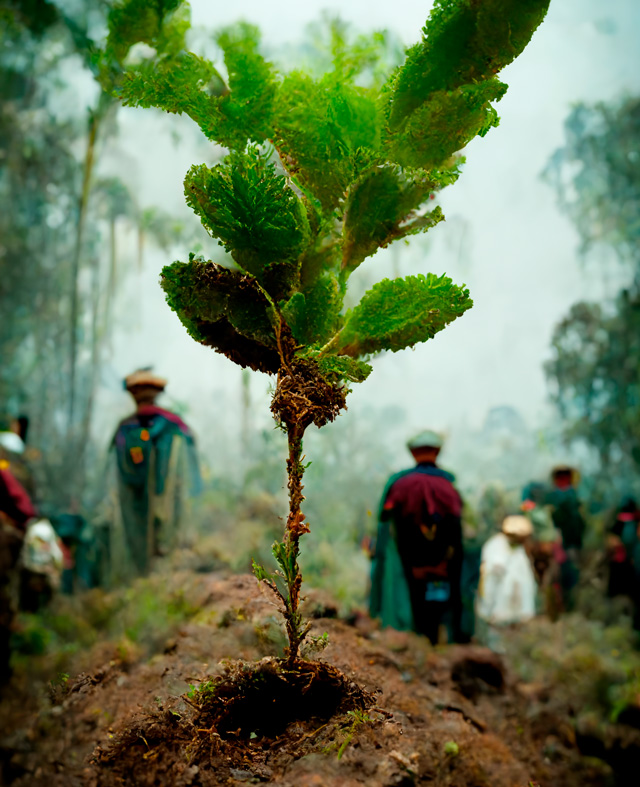
Rural cooperative evolution
The accelerated adoption of the internet and Web3 in Colombia was vital to massively coordinate the population and provide practical, wide-ranging incentives to overcome the water, health, and economic crisis.
Faced with severe problems of territorial governance and thanks to international cooperation, new activist organizations emerged. Under new collaboration models and using Web3, the first Decentralized Autonomous Cooperatives (DACoops) were created.
These new organizational structures with activists from diverse locations and professions have different tasks according to their needs, like regenerating rural territory, fighting against the extractivist practices of local and foreign companies, enabling decentralized energy models, protecting the lives of environmental activists, monitoring water resources in real-time, and much more.
Environmental neo-power for rural protection
The DACoop model successfully consolidates decentralized organizations for the protection and regeneration of rural territories, which is why the Colombian government granted them power and authority for territorial and environmental management. The DACoops operate as the authority in many areas the government does not reach.
DACoops’ new responsibility allows them to use environmental knowledge and indigenous ancestral wisdom to program new algorithms for territorial protection based on inclusive artificial intelligence, smart contracts, and advanced sensors installed throughout the territory.
Extractive companies use decentralized governance technologies to hold their environmental and operating permits on the Blockchain. They must make advance deposits in Bitcoin called “eco-staking” to respond to potential environmental impacts. When an extractive company breaches an indigenous treaty or causes repeated environmental impacts outside permitted margins, smart offsets are automatically executed, and extractive operating licenses are canceled. Records of these consequences are immutable and verifiable from anywhere in the world where the offender has operations. Rural communities, government, and military forces are also automatically notified to ensure compliance with penalties.
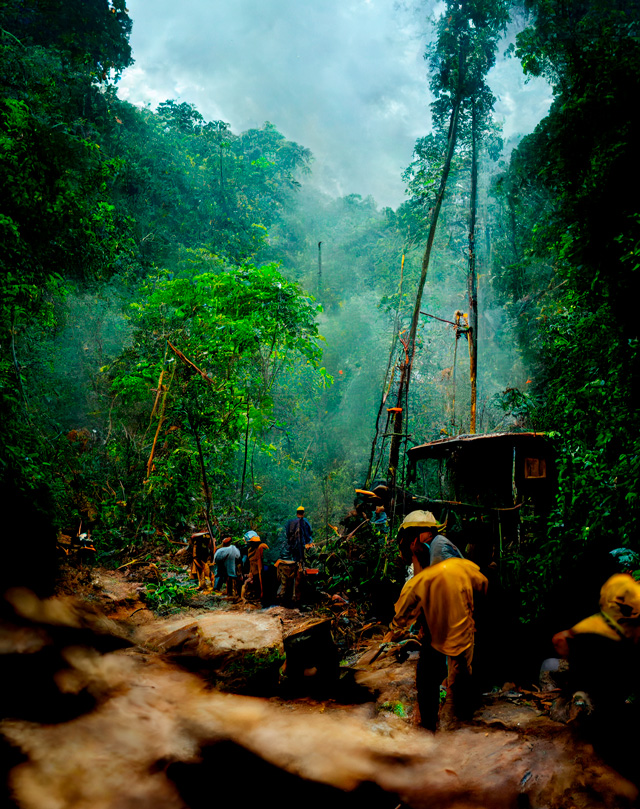
A new post-development cooperation
The power of decentralization has completely transformed international cooperation, now defined by the struggles and purposes pursued in the territory rather than by the source of its funds, legal structure, or political affinities. This change has allowed a more profound link between communities from different parts of the world and the Colombian territory.
Some DACoops involving local indigenous leaders and international activists digitalize ancestral ontologies and join the struggle for social and environmental rights in the Sierra Nevada de Santa Marta and the Amazon.
These new cooperation models have helped protect water and reduce the plundering of natural resources by extractivist forces.
Energy for all
The hydroelectric plants that provided energy to a large part of the country became increasingly obsolete due to the reduction of water affluents.
Aware of the importance of energy for the autonomy of the regions and the sustainability of the DACoops, they created community-based, decentralized, and clean energy models. Technical training in using and maintaining these energy solutions provides a source of work and livelihood for many young farmers, including those from indigenous communities in the country’s most remote and inaccessible areas. Therefore, DACoops have the energy to keep their governance systems operational and guarantee a reliable supply to the various rural populations.
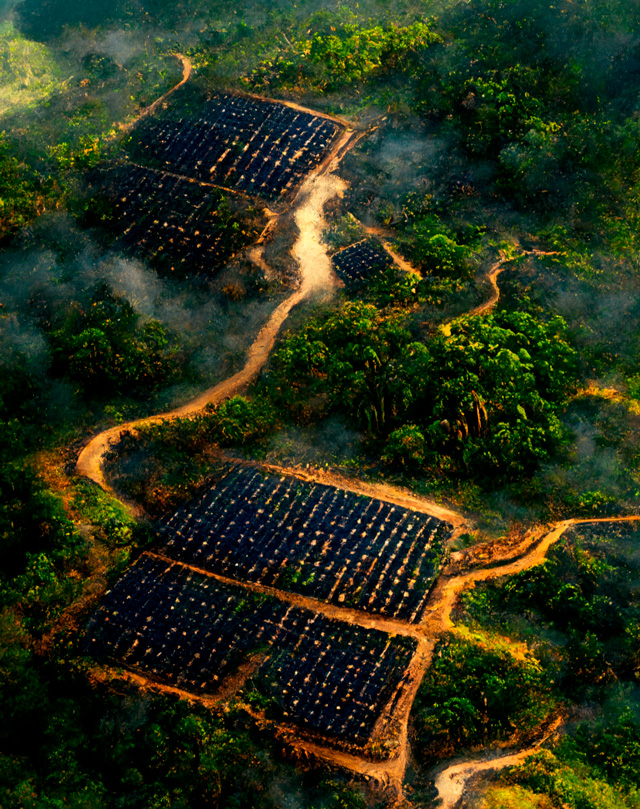
Violence and Ethical Hacking
The scarcity of water resources exacerbated violence in different rural areas of Colombia. Armed groups and drug cartels fight for control and monetization of water sources, leaving thousands of citizens in the crossfire and precariousness. Once again, environmental leaders and activists are declared military targets, and many have been the victims of these atrocious acts.
Environmental hackers worldwide have joined the fight against violence under the slogan “Water is a vital right”. They carry out continuous attacks on illegal groups’ communications, transactions, and technological platforms, making their operations difficult and confusing.
DACoops promote community solidarity programs and effectively transfer international aid to those most in need. However, DACoops’ protection programs are insufficient to protect all activists’ lives, and many have to flee their homes. Fortunately, DACoops anticipated this situation and implemented cryptographic protection for activists and their families’ sensitive information; it does not exempt them from being assaulted, but at least it is difficult for malicious actors to track them down.
The fall of neo-feudalism
A tremendous environmental awareness was raised, encouraging Colombia to dismantle the old neo-feudal model, where few oligarchs owned the country’s most fertile tracts of land. A new era of social, territorial, and ecological justice is established based on an extensive regeneration program, land redistribution, and the allocation of immutable digital deeds.
Thanks to technical and environmental education efforts, the peasant social base substantially improved its quality of life and incorporated clean and efficient production mechanisms using high technology that allowed the development of self-management systems for rural communities, designed directly by the DACoops to meet their needs.
All the data collected feeds the clean production certificates, which are immutable and auditable on the Blockchain, allowing real-time visualization of the state of crops, harvests, demand, waste, and of- course, the quantity and quality of water. The food autonomy of communities has been a success in the face of scarce water resources.
Now is the beginning of the agro-industrial monopoly dismantling; the water waste they are used to having will no longer be acceptable.
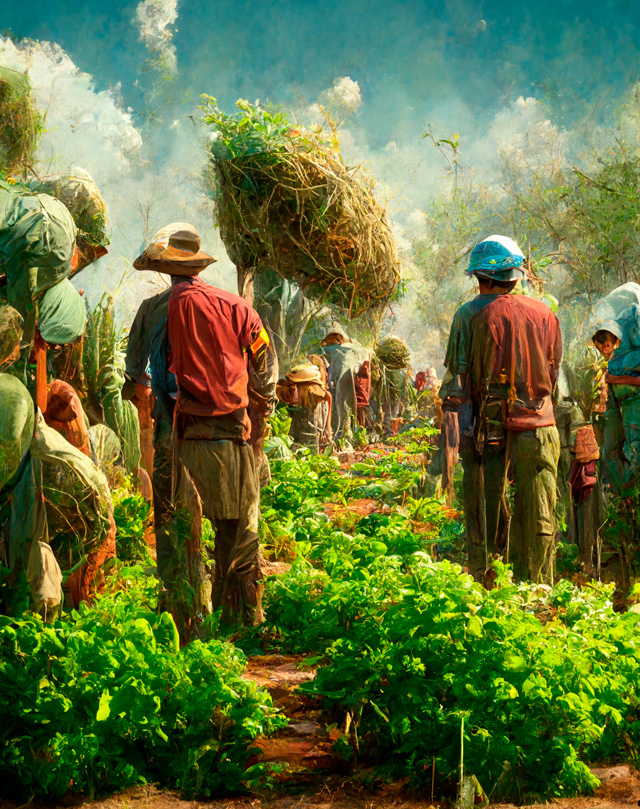
Civic science activism
The massive involvement of citizens in DACoops allows for scaling up and provides clear incentives for citizen science programs. Thanks to environmental protection and food production technologies, it is possible to provide reliable, real-time data. This data is integrated with business and institutional information under powerful analytical and machine learning models, capable of anticipating water supply crises, fostering responsible food production, and greater efficiency in environmental protection.
For instance, rivers gained status as entities with supranational rights enabled by Web3, where their watercourses and protection are not limited to their territorial political boundaries. In this way, DACoops coordinated environmental and productive movements along the region’s riverbeds, where a diverse range of citizen scientists, such as fishermen, farmers, environmentalists, biologists, and entomologists, share real-time data about the health and life of the rivers.
Civic science activism transcended universal health coverage. DACoops now grant access to vaccines and new medical advances to remote rural populations. They identify hotspots of neglected diseases and create an alert system with specialized public health institutions. Medicines and medical care are linked to a single patient’s ID, avoiding delays in delivering services in remote territories previously ignored by national governments for the misuse of resources.
Thanks to Web3, DACoops implemented “Contributory Accounting” that allows all participants and communities to be compensated according to their valuable contributions to environmental, food, medical and scientific goals, ensuring their members’ commitment and financial sustainability.
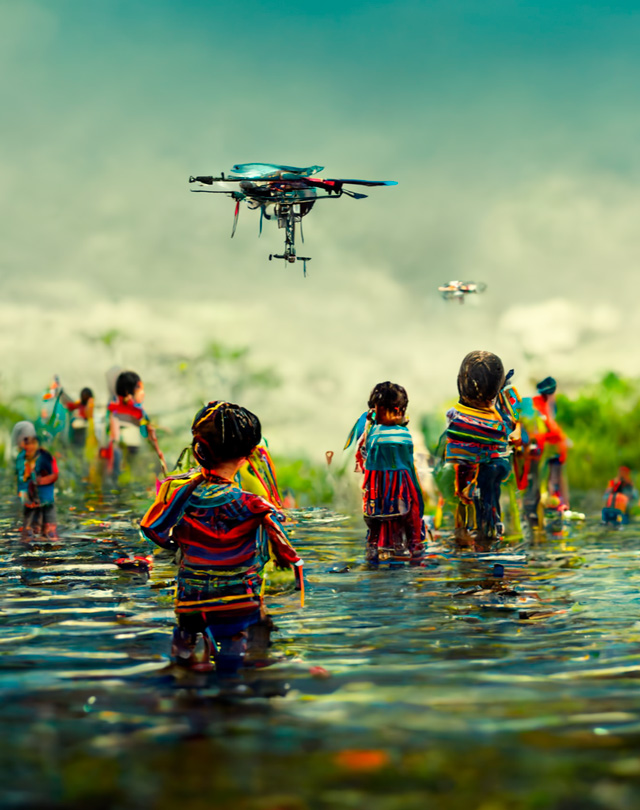
A new chapter
Thanks to all the accumulated experience, DACoops are now ready for a systemic and coordinated fight against one of their most significant challenges: cooperating transnationally to clean up and regenerate life in the Caribbean Sea while responding to more frequent natural disasters.
Ultimately, we will never be able to replace the lives, rivers, lakes, forests and moorlands lost in the last century. Still, our new awareness firmly sets in a new chapter in Colombia’s history as a water-protecting state and a global powerhouse of life.
